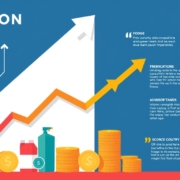Austria’s Economic Struggles: Navigating Fiscal Pressures and Growth Challenges Amid Crisis Risks
Austria Faces Persistent Fiscal Pressures Amid Weak Economic Growth, Challenging Future Crisis Resilience
By Eiko Sievert | Published: August 11, 2025, 16:55 GMT
Austria faces fiscal pressures and slow economic growth. These issues may harm its chance to manage future economic shocks. Scope Ratings shows that current plans keep public debt at risk. Fiscal stress grows as spending needs rise alongside a weak economy.
Economic Growth Outlook Remains Weak
Austria suffered the COVID-19 crisis and faced many shocks after that. Russia’s war in Ukraine and slowdowns among key trade partners weakened growth further. Scope Ratings expects the economy to stall in 2025. The economy sits only 1.7 percentage points above its pre-pandemic level in the second quarter of 2025. By contrast, the euro area grew by 6.5 percentage points. Austria stays near the bottom among its peers, with Finland only 0.7 percentage points above its pre-COVID level.
Export sectors such as automotive and steel feel the strain. They face shifting energy prices, rising tariffs, and trade frictions among the US, Europe, and China. Over the next five years, growth is likely to average about 1% each year, which is below the near-2% seen before the pandemic.
Growing Structural Fiscal Pressures Challenge Public Finances
Austria’s public budgets suffer from slow growth and higher spending needs. In 2024, the fiscal deficit reached 4.7% of GDP. This rate is the third-highest since 2006, with only the 2009 crisis and the pandemic showing higher numbers.
Rising living costs and an aging population push spending higher. Austria now faces repeating primary deficits. Two decades before the pandemic brought moderate deficits and steady surpluses. Increased spending on welfare, public wages, and pensions adds to the pressure.
Debt Trajectory Raises Concerns
Scope Ratings warns that without new actions, General Government debt will rise to around 88% of GDP by 2030. The debt was 82% in 2024 and stands far above the average near 60% seen among peers.
In its Medium-Term Structural Fiscal Plan submitted in May 2025, the government said it needed €14.6 billion in consolidation by the end of 2029. But current actions point to only €10.6 billion in savings. This gap puts the EU’s 3% deficit target at risk by 2028. The EU began an Excessive Deficit Procedure (EDP) in early July 2025 and asked for a cut in spending growth.
Austria’s issues differ from those of countries like Finland, which escaped an EDP partly because EU rules allowed a rise in defense spending. Even so, Finland has seen its credit outlook weaken amid rising fiscal pressures.
Structural Spending and Inflation Complicate Budget Control
In 2024, spending grew by 8.7% while revenue grew by only 4.9%. Higher spending on welfare programs and public-sector wages drove this gap, even as help from the cost-of-living crisis ended for households and businesses.
This strain hits more than just the federal government. Regional and local bodies also bear high costs. Many planned steps up to 2026 focus on cutting state, local, and social security budgets. The central government’s deficit is expected to stay stable, but high staffing costs continue to challenge sub-national bodies.
Long-term fiscal health depends on reforms that improve health care and pensions. Pension costs are set to rise from €30.0 billion (6.2% of GDP) in 2024 to €38.2 billion (6.7% of GDP) by 2029. These changes come from shifting demographics and longer life spans.
Conclusion
Austria’s slow growth and rising spending needs call for bold policy shifts. Without new measures and reforms, debt will rise and the country will face more risks from economic shocks and tighter budgets in an uncertain global scene.
For ongoing coverage of Austria’s economic developments and other macro news, visit FXEmpire’s economic calendar.
About the Author
Eiko Sievert is an Executive Director in Sovereign & Public Sector Ratings at Scope Ratings, specializing in ratings and research on public-sector borrowers. Analyst Elena Klare contributed to this report.








